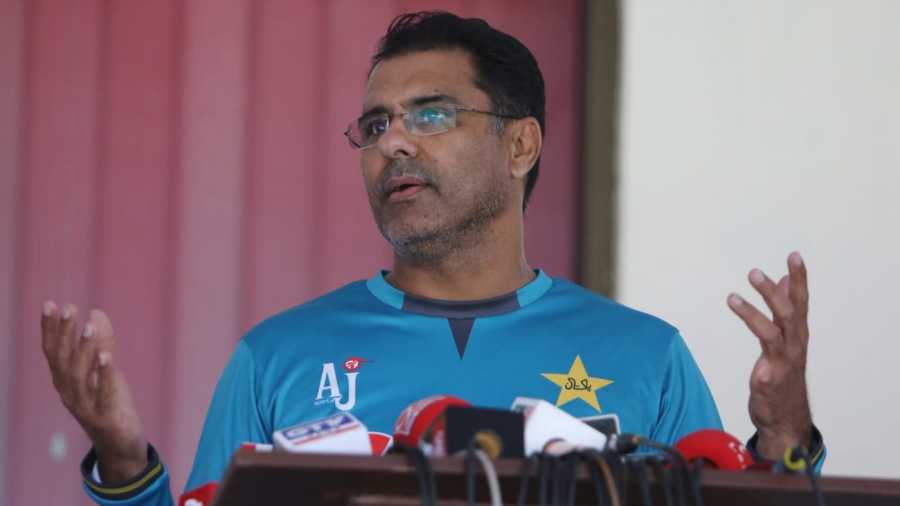 Misbah-ul-Haq speaks to the press © PCB
Misbah-ul-Haq speaks to the press © PCB
Pakistan are not fans of the idea of four-day Test cricket, with the current leaders of the coaching staff, head coach Misbah-ul-Haq and bowling coach Waqar Younis both opposing reducing Test cricket to four days. They join a growing chorus of coaches and former players, including former Pakistan coach Mickey Arthur, as well as India’s head coach Ravi Shastri, Mahela Jayawardene and Chris Gayle, who do not wish to see four-day Test cricket.
ESPNcricinfo understands the Pakistan Cricket Board shares the opposition to four-day Test cricket, believing it would pose a logistical challenge to hosting cricket in Pakistan, with fewer daylight hours during the cricket season. Going by history, that would not be especially surprising, given Pakistan often struggled to get 90 overs in a day of Test cricket in the ten years leading up to 2009, prompting the then-PCB chairman Shaharyar Khan to propose six-day Test matches to the ICC in a bid to get around the problem, with former ICC chief executive Malcolm Speed saying they would “seriously consider it”.
ALSO READ: ‘Don’t mess with Tests’
“First of all, there is no clarity at this point about how it will be taken forward,” Misbah said. “Will it be 90 overs a day? 96? Maybe 110 overs to compensate for the fifth day? If you look at the conditions in Asia, especially in Pakistan, we barely manage to get 90 overs a day because the cricket season here is mostly during the winter. We don’t get long days in winter, or enough to complete even 90 overs. We lose 10-15 overs a day routinely. If you lose those across a four-day Test, with 360 overs, the match effectively becomes a three-and-a-half-day affair.
“If that’s the case, a lot of teams will become negative – if they fall even slightly behind in a match, they’ll go straight for the draw. The results ratio is already pretty low, that will worsen and people’s interest in Tests will dip. They want results. In a five-day match, even if there’s rain in the middle, there’s still enough time to try and force a result.”
 Waqar Younis at a media interaction during a training camp © PCB
Waqar Younis at a media interaction during a training camp © PCB
Misbah also highlighted the workload that might come with this change, especially its impact on the fast bowlers. “Another important thing – if you force the workload of five-day cricket into four days, with an increase in overs, then it is very difficult,” he said. “You still get only 11 players in the team. Most teams play with four bowlers. But even if they have five, the workload of 16-17 overs a day on your fast bowlers, or at the most 20, will become even more. So their injury risks will rise. And the quality of their bowling – if you raise the load of a 145-150kph bowler from 18 overs to 25-26, then what will happen? Their quality will be compromised.”
The ICC is likely to formally consider four-day Test cricket later in 2020 in order to free up calendar space, which is increasingly saturated with T20 leagues and bilateral commitments. The concept of regular four-day Test cricket has drawn contrasting views in the past week, with England captain Joe Root tepidly endorsing it, saying it was “worth trialling”, before reiterating his preference for five-day cricket after a thrilling finish at Cape Town. Meanwhile the likes of Virat Kohli, Nathan Lyon and Glenn McGrath, are all against further fiddling with the longest format.
“I don’t like to see any change to the length of this format at all,” Waqar told ESPNcricinfo. “It’s beautiful this way and when you trim it down to four days, you are going to compromise the standard of it. Hypothetically, one lengthy first innings can suck the fun out of the Test and the probability of drawn games will be too high. Every day in five-day Tests has its own intrigue and importance and the fifth day is the one that offers the most thrill.
“I know there have been several three or four day finishes as well but that is because of the pitches. Five-day Test cricket is special and it should be preserved the way it is. You already experimented with ODI cricket a lot and it’s still fine but Test cricket we should leave as it is.
ALSO READ: Strauss cautious on case for shortening Tests
“The temperament and patience level is set for five days and it is meant to gauge a player’s composure, fitness and his ability. Four-day cricket is going to add extra workload on bowlers because they’ll have to bowl a lot more and there’ll be no respite for them. Are you reducing the days simply for commercial value? For that, go ahead and try day-night cricket.”
Misbah also spoke about the importance of a fifth-day pitch. “The wear and tear of a pitch in five-day matches is different from that in four-day cricket. In the subcontinent, or even a place like Australia, the fifth-day pitch has a unique quality. Look at the England and South Africa Test – it went to the fifth day and was decided right at the end. Even the West Indies Test, the last Test Younis Khan and I played, went right to the end. The closer you get to the end of the fifth day, the more thrilling Test cricket becomes. The audience’s interest grows gradually. So I think all these things should be kept in mind and then we should make a decision.”
Umar Farooq is ESPNcricinfo’s Pakistan correspondent
© ESPN Sports Media Ltd.
Source: ESPN Crickinfo
